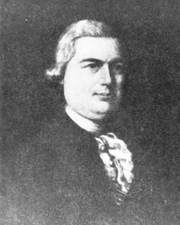Theodore Foster
| Theodore Foster | |
|---|---|
 |
|
|
United States Senator from Rhode Island |
|
|
In office June 12, 1790 – March 4, 1803 |
|
| Preceded by | None |
| Succeeded by | Samuel J. Potter |
| Member of the Rhode Island House of Representatives | |
|
In office 1791 1797 |
|
| Personal details | |
| Born |
April 29, 1752 Brookfield, Province of Massachusetts Bay |
| Died | January 13, 1828 (aged 75) Providence, Rhode Island, U.S. |
| Resting place | Swan Point Cemetery, Providence, Rhode Island |
| Political party | Federalist |
| Relations |
Dwight Foster Arthur Fenner Dwight Foster MA |
| Alma mater |
The College in the English Colony of Rhode Island and Providence Plantations Dartmouth College |
Theodore Foster (April 29, 1752 – January 13, 1828) was an American lawyer and politician from Rhode Island. He was a member of the Federalist Party and later the National Republican Party. He served as one of the first two United States Senators from Rhode Island and, following John Langdon, served as dean of the Senate.
Foster was born in Brookfield, Massachusetts in 1752. He engaged in classical studies at the College in the English Colony of Rhode Island and Providence Plantations (now known as Brown University), graduating in 1770. He then studied law and lived with fellow student Solomon Drowne. He was admitted to the bar association in 1771 and remained in Rhode Island to practice law, beginning his law practice in Providence. He was town clerk in Providence from 1775-1787. He earned his master's degree from Dartmouth College in 1786.
Foster was a protege of Brown University's first chancellor, Chief Justice of Rhode Island and Providence Plantations and revolutionary patriot Stephen Hopkins. Foster married the sister of the future governor of Rhode Island and Providence Plantations Arthur Fenner.
Foster played a role in the Gaspee Affair of 1772, along with John Brown and others, which helped catalyze events leading to up to the American Revolutionary War. Foster distinguished himself as a staunch supporter of General George Washington and the Federalist cause.
...
Wikipedia
